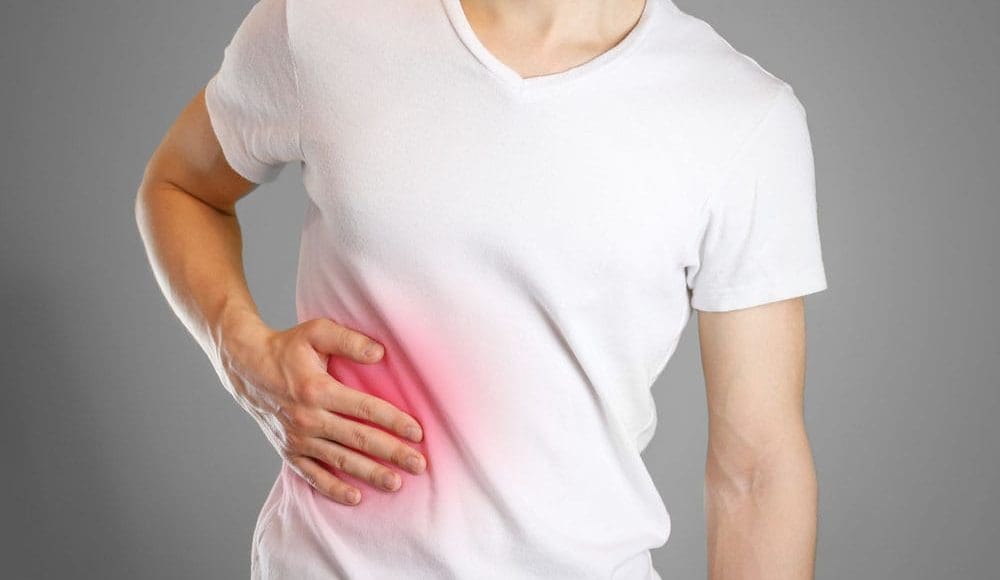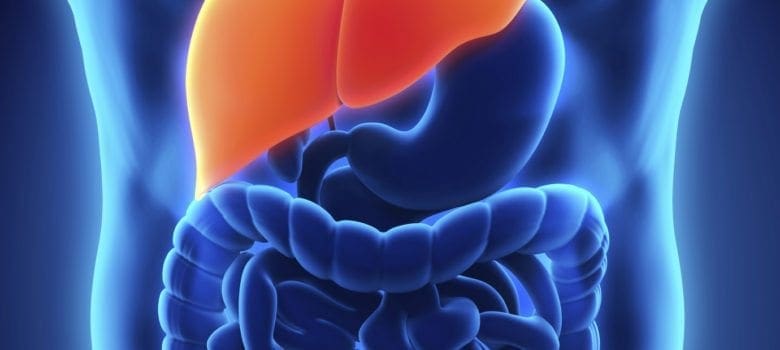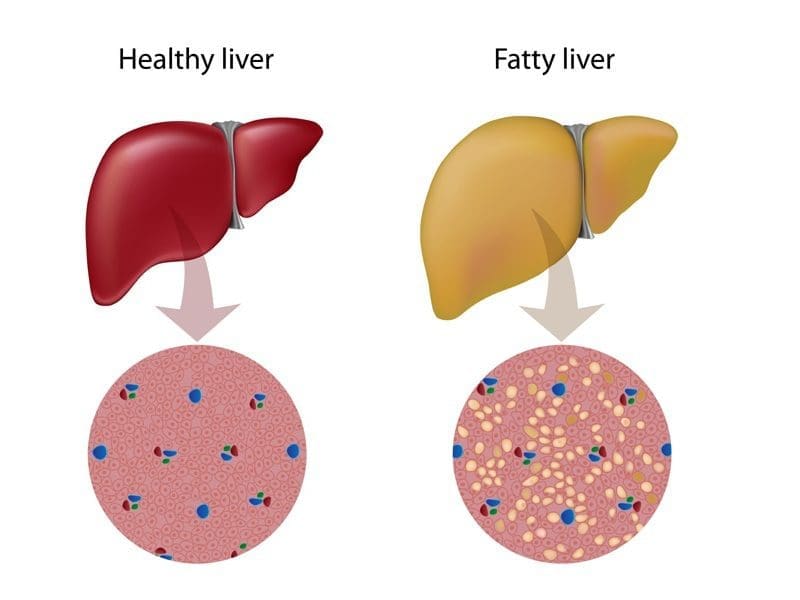Table of Contents
Introduction
The digestive system is home to many of the organs that help digest food into vitamins and nutrients and has a bidirectional with the central nervous system. The organs that consist in the digestive system include the stomach, the intestines (both large and small), and the liver to name a few. When there are unwanted factors and pathogens that enter through the mouth and into the digestive system can cause problems and unwanted symptoms like inflammation, leaky gut, and nonalcoholic fatty liver disease (NAFLD) pop up over time causing a person to be in pain. In this article, we will be taking a look at what the liver does in the body, what is NAFLD and its symptoms, as well as some treatments to prevent NAFLD’s effects on the body from rising. By referring patients to qualified and skilled providers who specialized in gastroenterology services. To that end, and when appropriate, we advise our patients to refer to our associated medical providers based on their examination. We find that education is the key to asking valuable questions to our providers. Dr. Alex Jimenez DC provides this information as an educational service only. Disclaimer
Can my insurance cover it? Yes, in case you are uncertain here is the link to all the insurance providers we cover. If you have any questions, please call Dr. Jimenez at 915-850-0900.
What Does The Liver Do?
About the size of a football, the liver is a reddish-brown wedge-shaped organ that has many functions that help the body stay functional. Research studies show that the liver has many physiological processes like macronutrient metabolism, blood volume regulation, immune support, helps control growth signaling pathways for the endocrine system, and many more. Located in the upper right-hand portion of the body and on top of the stomach, the liver is an essential organ that provides proteins and hormones that the other organs need in the body. Other research studies have shown that some of the jobs that the liver does for the body include:
- Stores glycogen and vitamins for the body to use later
- Make bile fluid to help the body digest food
- Cleans toxins out of the blood
- Metabolizes proteins, carbohydrates, and fats
- Produces substances to help with blood clots
HCTP Therapy
Stem cells* or HCTP (human cellular tissue products) are used in both affiliated clinics and distribution organizations as a form of regenerative cellular treatments to help boost the body’s own natural healing process. Some of the beneficial properties that HCTP provides to the body is that it helps repair and regenerate damaged cells, diseased organs, and tissues back to their original state and function in the body. With much more upcoming research on the benefits that HCTP provides to the body, many individuals can begin to feel better and continue on their wellness journey pain-free.
What Is NAFLD?
NAFLD or nonalcoholic fatty liver disease is a range of liver conditions that affect the liver. Research studies have shown that NAFLD has several phases of progressions in the body since it has a benign course as a silent liver disease due to the presence of hepatic injury with inflammation. Since 3-6 million Americans with viral hepatitis don’t know they are infected with NAFLD, there could be many factors that can lead to the progression of NAFLD. In 2004, the National Institute of Health estimated the annual costs in the US of chronic liver disease and cirrhosis is $1.6 billion. However, the most recent estimates of the population with liver disease in the US range from 15 to 30 million, indicating that the annual cost may range from $5 to $10 billion. Other studies have found that NAFLD is a growing pandemic worldwide due to obesity and insulin resistance that can lead the liver to accumulate triglycerides and free fatty acids in the body.
The Symptoms
Research studies show that in most cases fatty liver diseases don’t cause any serious problems or prevent the liver from functioning properly unless the person has it and the disease gets worse over time as it progresses in three stages. The first stage is known as steatohepatitis, where the liver becomes inflamed causing tissue damage. The second stage is fibrosis, where scar tissues begin to form on the damaged areas of the liver. And finally, the third stage is cirrhosis, where there is extensive scar tissue replacing the healthy liver tissues. Other symptoms that NAFLD can cause in the body include:
- Abdominal pain
- Nausea
- Jaundice
- Edema
How To Treat Liver Disease?
There are ways to prevent liver disease from progressing further in the liver and can be reversed when there is a sign of early liver damage. The amazing thing about the liver is that it has the ability to repair itself and utilize different treatments to prevent progressive liver disease from causing further damage. Research studies have shown that lifestyle interventions, pharmacological therapy, exercise, and caloric restrictions are beneficial to treat liver disease.
Exercise
Doing any sort of exercise is beneficial not only for the body but also for the liver. Research studies show that when a person exercises, there will be an increase in fatty acid oxidation, a decrease in fatty acid synthesis, and mitochondrial and hepatocellular damage will be prevented and reduced. Physical exercises can improve fatty liver disease and help individuals lose weight, lower their insulin and reduce the excess free fatty acids. Another beneficial property that physical activity can provide to individuals is that it can improve their moods and stop neurological disorders from progressing as well. Other research studies have shown that with the combination of calories restriction, physical activity can effectively decrease the intrahepatic lipid component.
Conclusion
All in all, the liver is part of the digestive system where it sends out nutrients and vitamins to the entire body. When there are unwanted pathogens that enter through the mouth and disrupt the digestive system, it can cause chronic symptoms like inflammation and nonalcoholic fatty liver disease and damage the liver. Since NAFLD is a chronic progressive disease, by incorporating treatments like eating healthy, exercising, and taking supplements can help people be pain-free on their wellness journey.
References
Beaton, Melanie D. “Current Treatment Options for Nonalcoholic Fatty Liver Disease and Nonalcoholic Steatohepatitis.” Canadian Journal of Gastroenterology = Journal Canadien De Gastroenterologie, Pulsus Group Inc, June 2012, https://www.ncbi.nlm.nih.gov/pmc/articles/PMC3378283/.
Benedict, Mark, and Xuchen Zhang. “Non-Alcoholic Fatty Liver Disease: An Expanded Review.” World Journal of Hepatology, Baishideng Publishing Group Inc, 8 June 2017, https://www.ncbi.nlm.nih.gov/pmc/articles/PMC5468341/.
Berzigotti, Annalisa, et al. “Physical Activity and Liver Diseases.” Hepatology (Baltimore, Md.), U.S. National Library of Medicine, Mar. 2016, https://pubmed.ncbi.nlm.nih.gov/26313307/.
Kudaravalli, Pujitha, and Savio John. “Nonalcoholic Fatty Liver.” StatPearls [Internet]., U.S. National Library of Medicine, 19 July 2021, https://www.ncbi.nlm.nih.gov/books/NBK541033/.
Medical Professionals, Cleveland Clinic. “Fatty Liver Disease: Risk Factors, Symptoms, Types & Prevention.” Cleveland Clinic, 31 July 2020, https://my.clevelandclinic.org/health/diseases/15831-fatty-liver-disease.
Medical Professionals, Cleveland Clinic. “Liver: What It Does, Disorders & Symptoms, Staying Healthy.” Cleveland Clinic, 22 Feb. 2021, https://my.clevelandclinic.org/health/articles/21481-liver.
Trefts, Elijah, et al. “The Liver.” Current Biology: CB, U.S. National Library of Medicine, 6 Nov. 2017, https://www.ncbi.nlm.nih.gov/pmc/articles/PMC5897118/.
van der Windt, Dirk J, et al. “The Effects of Physical Exercise on Fatty Liver Disease.” Gene Expression, Cognizant Communication Corporation, 18 May 2018, https://www.ncbi.nlm.nih.gov/pmc/articles/PMC5954622.
Disclaimer
Post Disclaimer
Professional Scope of Practice *
The information on this blog site is not intended to replace a one-on-one relationship with a qualified healthcare professional or licensed physician and is not medical advice. We encourage you to make healthcare decisions based on your research and partnership with a qualified healthcare professional.
Blog Information & Scope Discussions
Welcome to El Paso's Premier Wellness and Injury Care Clinic & Wellness Blog, where Dr. Alex Jimenez, DC, FNP-C, a board-certified Family Practice Nurse Practitioner (FNP-BC) and Chiropractor (DC), presents insights on how our team is dedicated to holistic healing and personalized care. Our practice aligns with evidence-based treatment protocols inspired by integrative medicine principles, similar to those found on this site and our family practice-based chiromed.com site, focusing on restoring health naturally for patients of all ages.
Our areas of chiropractic practice include Wellness & Nutrition, Chronic Pain, Personal Injury, Auto Accident Care, Work Injuries, Back Injury, Low Back Pain, Neck Pain, Migraine Headaches, Sports Injuries, Severe Sciatica, Scoliosis, Complex Herniated Discs, Fibromyalgia, Chronic Pain, Complex Injuries, Stress Management, Functional Medicine Treatments, and in-scope care protocols.
Our information scope is limited to chiropractic, musculoskeletal, physical medicine, wellness, contributing etiological viscerosomatic disturbances within clinical presentations, associated somato-visceral reflex clinical dynamics, subluxation complexes, sensitive health issues, and functional medicine articles, topics, and discussions.
We provide and present clinical collaboration with specialists from various disciplines. Each specialist is governed by their professional scope of practice and their jurisdiction of licensure. We use functional health & wellness protocols to treat and support care for the injuries or disorders of the musculoskeletal system.
Our videos, posts, topics, subjects, and insights cover clinical matters and issues that relate to and directly or indirectly support our clinical scope of practice.*
Our office has made a reasonable effort to provide supportive citations and has identified relevant research studies that support our posts. We provide copies of supporting research studies available to regulatory boards and the public upon request.
We understand that we cover matters that require an additional explanation of how they may assist in a particular care plan or treatment protocol; therefore, to discuss the subject matter above further, please feel free to ask Dr. Alex Jimenez, DC, APRN, FNP-BC, or contact us at 915-850-0900.
We are here to help you and your family.
Blessings
Dr. Alex Jimenez DC, MSACP, APRN, FNP-BC*, CCST, IFMCP, CFMP, ATN
email: coach@elpasofunctionalmedicine.com
Licensed as a Doctor of Chiropractic (DC) in Texas & New Mexico*
Texas DC License # TX5807
New Mexico DC License # NM-DC2182
Licensed as a Registered Nurse (RN*) in Texas & Multistate
Texas RN License # 1191402
ANCC FNP-BC: Board Certified Nurse Practitioner*
Compact Status: Multi-State License: Authorized to Practice in 40 States*
Graduate with Honors: ICHS: MSN-FNP (Family Nurse Practitioner Program)
Degree Granted. Master's in Family Practice MSN Diploma (Cum Laude)
Dr. Alex Jimenez, DC, APRN, FNP-BC*, CFMP, IFMCP, ATN, CCST
My Digital Business Card




